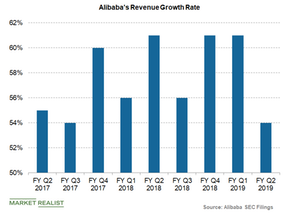Alibaba Foresees Tempered Revenue Growth amid US-China Worries
Alibaba reported soft revenues in the second quarter of fiscal 2019, as the e-commerce giant is struggling to gain momentum amid the growing tensions between the US and China.
Nov. 15 2018, Updated 9:05 a.m. ET

Alibaba’s soft revenues in Q2
China-based Alibaba (BABA) reported soft revenues in the second quarter of fiscal 2019, as the e-commerce giant struggled to gain momentum amid the growing tensions between the US and China (MCHI) (FXI).
While Alibaba’s adjusted earnings of $1.40 per share surpassed the consensus estimates by 25% and were 14.8% higher on a YoY basis, revenues showed weakness in the second quarter. Alibaba’s second-quarter revenue of 85.15 billion Chinese yuan (or $12.4 billion) missed the Wall Street expectations of $12.7 billion.
Alibaba foresees weakness in revenue growth
Alibaba posted revenue growth of 54% YoY in the second quarter, which came from the company’s core e-commerce retail business, the consolidation of Ele.me and Cainiao Network, as well as the strong performance of Alibaba Cloud. Alibaba has posted ten straight quarters of revenue growth above 50%. However, the trade war worries might impact the company’s revenues from international markets, especially the US.
The company is struggling with weaker-than-expected consumer spending during the quarter, which adversely impacted Alibaba’s core retail business and led to soft sales growth of durable items, especially consumer electronics.
Amid growing concerns about the US-China trade war, Alibaba has slashed its revenue expectations for fiscal 2018, which ends in March 2019. The Chinese online retail giant has lowered its revenue expectations by 4% to 6% in the fiscal year and expects revenues in the range of 375 billion Chinese yuan to 383 billion Chinese yuan due to delayed monetization and worries over the economic impact of a US-China trade spat.
According to Gil Luria, director of research at D.A. Davidson, if the trade war tension persists, exports from China to the US could diminish, which could put the company’s core business at risk and could slow down the Chinese economy and hurt consumption.
